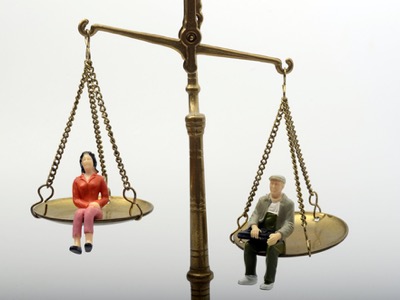Why Gender Equality is Good for Men – Part Three of Three
Guest Contibuted column by Lisa Levey
Parts one and two of Exploring Why Gender Equality is Good for Men have highlighted how the familiar trope that gender equality is a boon for women and a bust for men is just plain wrong.
Today, we spotlight how gender equality is linked to positive career, and most significantly overall life, satisfaction.
Gender equality supports men’s satisfaction in the workplace and in their lives
Men in more egalitarian couples report greater job satisfaction and less intention to leave their jobs. It follows that men who don’t feel as beholden to problematic work norms [having more flexibility and choices] and who spend more time with their children, developing stronger relationships, are better able to enjoy rather than feeling trapped by their work.
Men who feel less pressure to conform to rigid stereotypical gender roles have a stronger sense of being in a high quality relationship with their partner, and may even have more, and better, sex. A controversial 2014 New York Times article Does a More Equal Marriage Mean Less Sex?, that reported more traditional gender norms meant less sex when it came to household chores, caused a stir. The problem was the 1980’s data meant many of the couples married in the 1970’s or earlier, when changing gender norms were far less acceptable.
A Cornell professor and her colleagues analyzed 2006 data and found more egalitarian couples indicated having sex as frequently, if not more so, in addition to reporting as great or greater satisfaction, than peers in more traditional relationships.
Based on data for men across European countries and American states, a 2010 study concluded that men in more gender equal societies – compared with those in more traditional ones – had a better quality of life overall based on factors such as less violence and stronger marriages.
It’s not difficult to understand why many men feel disoriented as shifting gender norms continue to redefine what it means to be a man. The masculinity code – translated as needing to always be in control, focusing disproportionately on accomplishment, suppressing emotions of sadness and tenderness, and perhaps most challenging of all, continually needing to prove one’s manliness, day in and day out – was clear.
But that definition of masculinity, while accruing benefits for men, also does great harm. Ironically, that masculine worldview is largely responsible for the challenges plaguing men today – jobs sent overseas to maximize profits, a revised employer- employee value proposition that’s transactional in nature, an implosion of the financial markets brought on by out-sized risks, technology without safeguards, and the list goes on.
Men demonizing gender equality are sadly fighting the wrong enemy. Gender equality is about men having more choices and less pressure, more support and less isolation. Males live in a gender straight jacket with a long list of “shoulds”that define how men must behave – and not behave – to be deemed worthy.
In recent decades the world has opened up for women to new possibilities and ways of being [and yes, big challenges remain] yet men are deeply constrained by old gender scripts.
Gender equality is not the enemy of men. In fact, it just may be thing that can finally set them free.
Contributor Bio
Lisa Levey is a veteran diversity consultant, having worked with leading organizations for more than two decades to assist them in realizing the underutilized leadership potential of women. Her current work focuses on engaging men as allies and partners. She led the design and development of the Forte Foundation’s Male Ally signature resource platform for engaging men in diversity work and architected a pilot program to launch corporate male ally groups. She blogs for the Huffington Post and the Good Men Project on gender norms at work and at home. In the spring of 2018 partnering with her husband Bryan, Lisa is launching Genderworks, a coaching practice for dual-career professional parents to support them in navigating the obstacles to gender equality at work and at home. Lisa earned an MBA with highest honors from the Simmons School of Management and a BS with distinction from Cornell University in applied economics.
Disclaimer: The opinions and views of guest contributors are not necessarily those of theglasshammer.com










